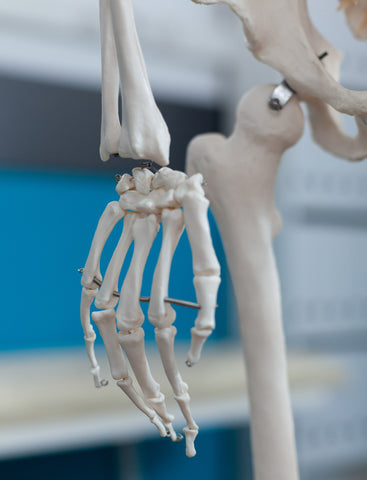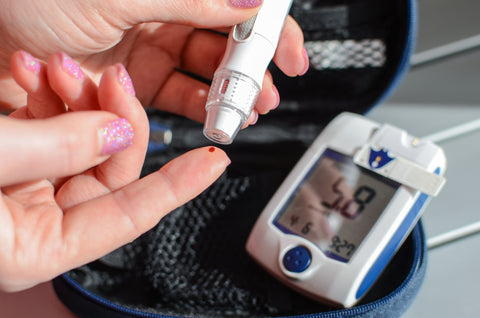Top 6 Benefits of Lysine

🎧 On the go? Listen to more metabolic health content on The GOOD IDEA Audio Blog, available on Spotify (link below) or Apple Podcasts.
In the kaleidoscope of health and wellness, certain elements, like lysine (also known as L-lysine), play a central and often overlooked role. In this blog post, we will explore the multitude of ways in which lysine, an essential amino acid and a fundamental building block of life, can enrich our well-being.
From its significant role in skin health to augmenting our cognitive resilience, the systematic integration of lysine-rich sources in our diet can effectively improve our overall health and vitality.

What is Lysine
Before delving into its bountiful health benefits,
let's first understand what lysine is and why it deserves our attention. Lysine is one of the nine essential amino acids, which means that the human body cannot manufacture it on its own.
As such, it's imperative to obtain lysine through dietary sources, including various proteins such as meat, fish, and dairy, as well as through supplementation, when necessary. While often overshadowed by its amino acid cousins, lysine's indispensable functions make it a critical constituent of our physiological processes and immune system.
Let's examine how . . .
1. Lysine Promotes Healthy Skin
Our body is a reflection of what we feed it, and our skin is no exception. Lysine, the unsung hero for fighting against acne and cold sores, does its duty quietly but effectively. Lysine works on multiple fronts to benefit the largest organ of our body (our skin, of course!):
Wound Healing
Lysine aids in the formation of collagen, the structure that supports and repairs damaged tissues, thus accelerating the wound-healing process.
Anti-Aging
As we age, collagen production decreases, leading to saggy and wrinkled skin. Lysine can help counteract this by stimulating collagen synthesis and preserving the skin's youthful elasticity.
Anti-Viral
Research suggests that taking lysine supplements could reduce the occurrence, severity, and healing time of cold sores. This is thanks to its ability to suppress arginine, another amino acid that can fuel these viral outbreaks.
2. Lysine Supports Immune Function
The immune system is our body's defense against the onslaught of pathogens and ailments. Lysine plays a pivotal role in maintaining a robust immune system in several ways:
Viral Defense
As mentioned earlier, lysine's ability to interfere with arginine metabolism may help prevent the replication of certain viruses, including the herpes simplex virus.
Antibody Production
Lysine supports the production of antibodies by the immune system, which are essential for recognizing foreign invaders and mounting an immune response.
Collagen Formation
Healthy immune function is reliant on collagen. This means that lysine's role in its synthesis indirectly supports immune competence.
3. Lysine Aids in Muscle Growth and Repair
Muscle growth and recovery are primary objectives for anyone who hits the gym, whether as a novice or a seasoned fitness enthusiast.
Lysine is integral in the synthesis of proteins, which is crucial for muscle development and repair. It does this by facilitating calcium uptake in muscle cells, which triggers the growth of muscle fibers.
Research has shown that lysine not only contributes to the building of muscle through its contribution as a building block with other amino acids, but it also aids in the activation of satellite cells. Satellite cells are a particular type of cell that is responsible for the muscle tissue's ability to grow and repair. Thus, consuming an adequate volume of lysine can be a helpful addition to an active lifestyle.
4. Lysine is Essential for Cognitive Health
Cognitive health is vital for our overall well-being, and lysine can contribute to it in several ways:
Neurotransmitter Production
As mentioned, lysine is necessary for the production of carnitine and glutamate, which plays a crucial role in synthesizing neurotransmitters such as acetylcholine. This helps maintain healthy cognitive processes, including learning and memory.
Stress Reduction
Lysine has been shown to reduce cortisol levels, a hormone responsible for stress and anxiety. By promoting relaxation and reducing tension, Lysine can help contribute to better cognitive health.
5. Lysine Maintains Bone and Dental Health
As we grow older, our bone and dental health become increasingly important, and lysine can help keep them in top shape.
Bone Health
Again, lysine is an essential component of collagen, the structural protein that gives bones their strength and density. By supporting collagen production, lysine dietary supplements can help maintain healthy bones and prevent conditions like osteoporosis.
Calcium Absorption
Research has shown that lysine may help your body absorb calcium, a vital mineral for bone health. When you help your body absorb calcium, you are helping the body to build strong bones. Lysine accomplishes this by stimulating the production of calcitonin, a hormone that regulates calcium levels in the blood.
Dental Health
Collagen is also present in our teeth's enamel. This makes lysine's role in collagen synthesis essential for maintaining strong and healthy teeth. Lysine may also have antiviral properties that could help prevent oral infections and cold sores.
Bone Density
Lysine is involved in the absorption of calcium and the production of osteocalcin, a peptide hormone that binds calcium to the bone matrix, contributing to skeletal strength.
6. Lysine May Improve Heart Health
Research has shown that lysine may have a positive impact on heart health in several ways:
Blood Pressure Regulation
Studies have shown that lysine supplementation may help lower blood pressure, which is a significant risk factor for heart disease.
Reducing Inflammation
Lysine has anti-inflammatory properties that can help reduce inflammation in the arteries and improve overall cardiovascular health.
Blood Clot Prevention
Lysine can help prevent blood clots by preventing the accumulation of lipoprotein(a), a type of cholesterol that can contribute to blood clot formation.
Supporting Collagen Production
Collagen is not only essential for bone and skin health but also the structure of blood vessels. Lysine's role in collagen production may contribute to maintaining healthy blood vessel function.
7. Lysine May Improve Blood Sugar Regulation
Lysine may be a beneficial supplement for individuals who are trying to control their blood sugar levels. Lysine can help your body turn excess glucose into glycogen or fat. This effectively reduces serum glucose concentrations (the amount floating around in circulation).
For this reason, lysine may be beneficial for individuals with diabetes, as it helps to regulate blood sugar levels. The blood sugar-reducing power of lysine is one of the reasons why we chose to include lysine in each GOOD IDEA drink.
How Can We Get More Lysine?
Lysine can be obtained from food sources or by taking supplements. Foods that are high in lysine include meat, cheese, fish such as cod, eggs, and soybeans. Lysine is also one of the five amino acids included in each GOOD IDEA drink, making GOOD IDEA a great way to increase your daily lysine intake while simultaneously helping to regulate blood sugar levels.
To get enough lysine through diet or supplements, you need to get at least 8-10 mg of lysine per day. Most people get around 10-14 mg per day by eating foods like meat and eggs, but vegetarians need to be more conscious of their intake. The good news is, there are multiple ways for non-meat eaters to consume this essential amino acid. Soybeans, spirulina, fenugreek seed, brewer’s yeast, and beans are all great sources of lysine.
Lysine FAQs
What are the dietary sources of lysine?
Lysine is an essential amino acid, meaning our body cannot produce it and we must obtain it from our diet. Foods rich in lysine include protein like meat and fish, dairy products, legumes, nuts, and seeds.
Can vegetarians and vegans get enough lysine from their diets?
Yes, but they may need to be more mindful of incorporating lysine-rich plant-based foods in their diet to meet daily requirements. Some good sources of lysine for vegetarians and vegans are legumes, quinoa, and tofu.
How does lysine help with skin health?
Lysine is essential for collagen synthesis, which contributes to maintaining skin elasticity and preventing wrinkles. It also supports the production of hyaluronic acid, a natural moisturizing compound that keeps our skin hydrated and plump.
Can lysine benefit those with chronic viral infections?
Research suggests that lysine may have antiviral properties and can help reduce the frequency and severity of outbreaks in individuals with chronic viral infections like herpes simplex virus.
Is lysine safe for children?
Lysine is generally considered safe for children when taken in recommended doses. However, it is always best to consult a healthcare provider before giving any supplement to children.
Can lysine improve hair health?
As an essential component of collagen, lysine can help maintain healthy hair by supporting the strength and structure of hair follicles. It may also have a role in promoting hair growth.
How much lysine should I take daily?
The recommended daily intake of lysine for adults is 12 mg per kg of body weight. Consult a healthcare provider for personalized recommendations based on your specific needs and health goals.
Who should avoid taking lysine supplements?
Individuals with kidney or liver disease, and those taking certain medications may need to avoid or limit lysine supplementation. It is always best to consult a healthcare provider before starting any new supplement regimen.
Conclusion
Lysine is an essential amino acid with a wide range of benefits for our overall health and well-being. From supporting muscle growth and recovery to promoting cognitive and heart health, dietary lysine plays a crucial role in various bodily functions.
By incorporating lysine-rich foods in your diet or taking supplements as needed, you can reap the many advantages of this important amino acid. Did you know GOOD IDEA contains lysine and other amino acids for optimal health as one of our main ingredients?
Check out our collection here!













